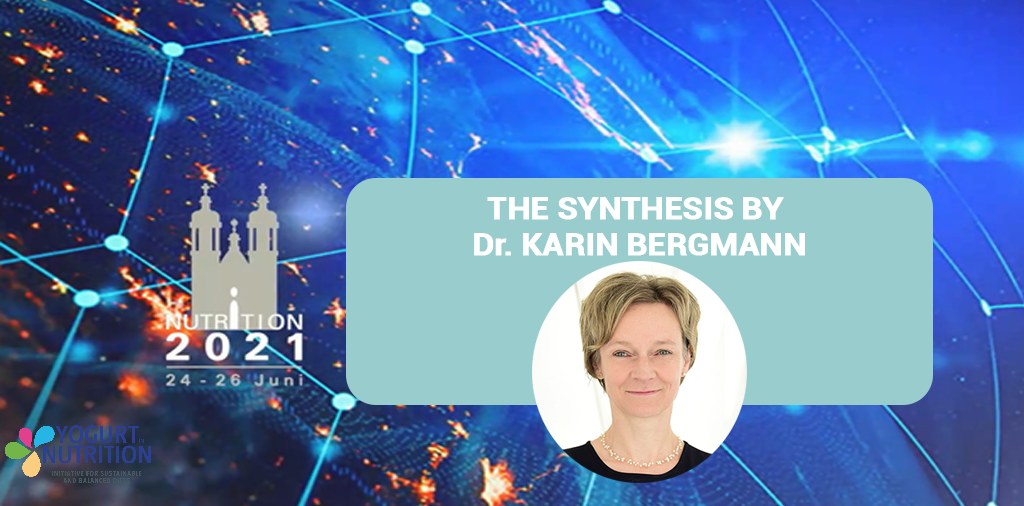Is the microbiome really influenced by diet and what effects do bacteria have on health events?
By Dr. Karin Bergmann
On the occasion of the international congress Ernährung 2021, the Yogurt in Nutrition Initiative for Sustainable and Balanced diets, asked me to write this blog post summarizing research presented at this events. I attended two symposia about gut health where highly renowned scientists in the field presented the current state of research on the connection between nutrition, microbiome and health.
The symposia had two guiding questions: is the microbiome really influenced by diet and what effects do bacteria have on health events?
Food leaves a fingerprint on the microbiome. Dirk Haller (Munich, Germany)
For many years, Prof. Dirk Haller (Technical University of Munich, Germany), among others, has been doing research on how diet and food shape the microbiome and what consequences this has for metabolism. He emphasizes that food leaves its fingerprint on the microbiome. Using modern analytical techniques, scientists have been able to show how diverse the colonization of the intestines of children and adults is – depending on the nation, region and food. Some disease patterns can also be identified in the composition of the microbiome. One thing is certain: Dietary patterns alter a person’s microbiota and have a lasting impact on the innate immune system. A new result of research in this context is that part of the bacteria is only active at very specific times of the day. That the microbiome of a person can be understood as an individual fingerprint of the metabolic situation is no longer in doubt. Whether it can also be “personalized” – i.e. adapted to individual risk factors through targeted intervention – is still an open question. Haller emphasizes: A personalized microbiome definitely also requires a personalized diet.
The gut microbiota interacts with the gut wall epithelium and with the intestinal immune system and vice versa! Philip Calder (Southampton, UK)
Prof. Philip Calder (University of Southampton) is a specialist in the interaction between the microbiome and the immune system. He asserts that a well-functioning immune system is the key to a good defense against pathogenic organisms. This is because the gut microbiome shapes the gut-associated immune system and vice versa. Very different organ systems benefit from this: events at the gut level can have effects in the periphery of the body. Thus, human studies confirm the existence of a gut-lung axis and gut-brain axis. An intact gut microbiome performs important signaling functions in both systems.
According to Calder, many human studies suggest that prebiotics and probiotics improve the body’s immune responses to external stimuli in a strain-specific manner. Calder summarizes their effects like this: Probiotics, on one hand, preempt the colonization of pathogenic intestinal bacteria. On the other hand, they also improve functional processes of the immune system and defend the host against bacteria and viruses. Both mechanisms ultimately have a common effect: they reduce infections. Studies that showed improved immune responses and reduced infections typically utilized lactobacilli and bifidobacteria.
Consider the 3 Ps: Prebiotics, probiotics, polyphenols. Sandra Holasek (Graz, Austria)
Prof. Sandra Holasek (Medical University Graz) summarized the current state of research in three points. For her, the new knowledge underpins that, firstly, that it is better to consider a food as a whole than its individual components. Secondly, it is the diversity of the microbiome that is crucial for health. Establishing such diversity calls for a diverse diet that includes a multitude of different foods. The official recommendations of the professional institutions for nutrition
Thirdly, it is important to pay attention to the “three P’s” (prebiotics, probiotics and polyphenols), which can result in a healthy microbiome. Using the Planetary Health Diet, these recommendations are easy to implement, especially with a daily allowance of dairy products and a high priority for plant-based foods.
The highly interesting session was the Microbiome Symposium in the Ernährung 2021 Science Program, where participants learned many new things about the microbiome regarding malnutrition, gut-brain communication, and fecal microbiota transplantation in three presentations.
Large differences in the microbiome from person to person. Laurence Genton (Geneva, Switzerland)
Prof. Laurence Genton (University Hospital Geneva) pointed out that there are large differences in the gut microbiome from human to human. She presented animal and human studies of different methodology on the relationship between microbiome, malnutrition and muscle mass. The results of the studies show that various supplements do not seem to be helpful. For example, there was no positive effect of supplemented branched-chain amino acids (BCAA) on microbiota diversity or muscle mass in malnourished patients. Instead, glycine, often used as a placebo in studies, unexpectedly increased lean muscle mass. Whether glycine can be a therapeutic option for disease-related malnourished patients in the long term should be explored more in the future. Otherwise, relationships between malnutrition and microbiome in the human body are currently not clearly known .
Multiple probiotics show stronger effects. Gerhard Rogler (Zurich, Switzerland)
Prof. Gerhard Rogler (University of Zurich) had news about the GUT-brain axis: microbiota changes may at least be associated with psychiatric diseases. He showed that gut bacteria produce neurotransmitters (dopamine, serotonin and tryptophan) and thus can influence depression and anxiety disorders. The studies he presented suggest that multiple probiotic strains help improve depression symptoms. Also interesting: when studies gave only a single probiotic for a defined period of time, the effect in the study was weak or nonexistent. When a mixture of different strains was given, the influence of probiotics on depression symptoms was better demonstrated in studies. This is another sign of how important the diversity of the microbiome as a whole is.
Microbiome transplantation needs more research. Herbert Tilg (Innbruck, Austria)
Prof. Herbert Tilg (University of Innsbruck) explained studies based on fecal microbiome transplants. The GUT microbiota contains more than 5,000 bacterial species, a high proportion of which are unknown and could not be cultured so far. Although this field of research is still in its infancy, the method of microbiome transplantation seems to have high therapeutic potential. The strongest evidence is available for the treatment of Clostridium difficile infections. However, good (considerable/reasonable?) effects can also be achieved today in Irritable Bowel Syndrome (IBS). Much application-oriented research is still needed in the future to gain more certainty for specific therapy options.
After Ernährung 2021, it is clear to me:
The microbiome influences the health of its host. The advice to healthy people – “Improve your microbiome!” – is thus a preventive, scientifically validated course of action. Therefore, there is now clear news for health care professionals:
- Healthy people need a healthy bacteria world.
- Desirable bacteria need a special atmosphere in the intestine that is conducive to them.
- Humans as “hosts” can do a lot for their bacterial world.
- Food diversity is important: A diverse microbiome needs diverse food.
- It’s never too late to improve the microbiome. The gut microbiome is a highly complex (system that takes a lifetime to develop and adapt to its host.
- People with diseases should talk to medical experts about gut health early. For patients, dietary changes are often associated with positive effects on gut health. But: concrete nutritional therapeutic decisions can only be made on the basis of individual parameters and specialized laboratory diagnostics.
- Overall: More attentiveness to these facts makes life easier.




